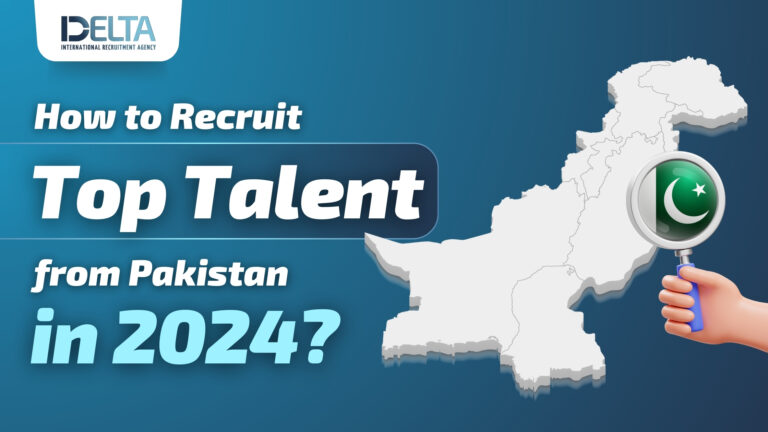Understanding the Pakistani Job Market
Current Trends in Pakistani Job Market
The Pakistani job market is evolving rapidly, with a significant shift towards technology and service-oriented roles. The demand for skilled professionals in IT and healthcare sectors is particularly high, reflecting global trends towards digitalization and an increased focus on health services.
Key sectors experiencing growth include:
- Information Technology
- Telecommunications
- E-commerce
- Financial Services
- Healthcare
The following table highlights the Top 10 In-Demand Jobs in Pakistan in 2024:
| Rank |
Job Title |
|---|---|
| 1 | Software Developer/Engineer |
| 2 | Data Scientist/Data Analyst |
| 3 | Digital Marketer |
| 4 | Healthcare Professionals |
This surge in demand for certain professions is creating a competitive job market where companies must strategize
effectively to attract top talent.
Challenges in Recruiting from Pakistan
Recruiting top talent from Pakistan presents unique challenges that organizations must navigate to ensure a successful hiring process. One significant hurdle is the intense competition for skilled professionals, particularly in sectors like IT, where global demand is high. Additionally, there is often a mismatch between the expectations of employers and the available workforce, which can lead to prolonged hiring cycles.
Several factors contribute to the complexity of recruiting in Pakistan, including:
- Cultural nuances: Understanding local customs and professional norms is crucial for effective communication and to avoid misunderstandings.
- Educational disparities: While there are highly educated individuals, the overall education level varies greatly, making it difficult to find candidates with the desired qualifications.
- Infrastructure issues: In some areas, unreliable internet and power outages can impede the recruitment process, especially for remote positions.
To overcome these challenges, companies must adopt a tailored approach that respects local practices and addresses the specific needs of the Pakistani job market.
Cultural Considerations for Hiring in Pakistan
When recruiting in Pakistan, it’s crucial to understand and respect the local culture, which can significantly influence the hiring process. Pakistan’s diverse cultural landscape requires a nuanced approach to recruitment, ensuring that the practices align with local customs and expectations.
One important aspect is the communication style. Pakistanis often prefer indirect communication and may avoid saying ‘no’ directly to maintain harmony. It’s important for recruiters to be sensitive to these subtleties to avoid misunderstandings. Additionally, building personal relationships and trust is key in the Pakistani business culture, which can be facilitated through face-to-face meetings and local networking events.
Here are some cultural considerations to keep in mind:
- Respect for hierarchy and seniority is paramount in the Pakistani workplace.
- Business dealings often involve a more relaxed approach to time, with a focus on relationship-building over punctuality.
- Utilize structured interview questions to ensure a fair and effective talent acquisition process.
Understanding these cultural nuances can lead to more successful recruitment outcomes and help foster a positive working relationship with Pakistani hires.
Effective Recruitment Strategies
Image Source: recruitee.com
Utilizing Social Media for Talent Acquisition
In the digital age, social media has become an indispensable tool for recruiting top talent from Pakistan. Platforms like LinkedIn, Facebook, and Twitter are not just for socializing but are also rich sources of potential candidates. Companies can leverage these platforms to post job openings, engage with job seekers, and even conduct preliminary assessments.
To effectively use social media for talent acquisition, it’s crucial to understand the difference between a job description and a job specification. A job description outlines the duties and responsibilities of a position, while a job specification details the qualifications and skills required. This distinction is vital for attracting the right candidates and setting clear expectations.
Here’s a simple list to ensure your social media recruitment is on point:
- Craft clear and engaging job postings.
- Use targeted ads to reach the desired audience.
- Engage with potential candidates by responding to comments and messages.
- Monitor your company’s social media reputation to attract top talent.
Building a Strong Employer Brand
In the competitive landscape of talent acquisition, building a strong employer brand is crucial for attracting top talent from Pakistan. A robust employer brand not only differentiates your company from competitors but also resonates with the values and aspirations of potential candidates. To establish such a brand, companies must communicate their mission, culture, and the benefits of working with them effectively.
Key elements of a strong employer brand include a clear value proposition, consistent messaging across all platforms, and a candidate-centric recruitment process. These elements ensure that candidates have a positive perception of your company from the outset. Here’s a list of steps to enhance your employer brand:
- Develop a compelling employer value proposition that highlights what makes your company unique.
- Ensure your company’s online presence reflects its culture and values.
- Engage with potential candidates through storytelling that showcases employee experiences.
- Monitor and manage your brand reputation by addressing feedback and reviews on job platforms.
By focusing on these areas, you can create an employer brand that not only attracts but also retains the best talent in Pakistan.
Leveraging Professional Networks
In the quest to recruit top talent from Pakistan, leveraging professional networks stands out as a highly effective strategy. Professional networks act as a bridge connecting employers with potential candidates, often leading to more personalized and direct recruitment opportunities. These networks can be particularly useful for identifying passive candidates who are not actively seeking new opportunities but are open to the right offer.
To maximize the potential of professional networks, consider the following steps:
- Identify key industry-specific networks in Pakistan, such as tech incubators, professional associations, and business forums.
- Engage with these networks by participating in events, webinars, and discussions to increase visibility and establish credibility.
- Utilize referrals from existing contacts within these networks to tap into a wider pool of candidates.
Building relationships within professional networks requires time and effort, but the investment can pay off significantly by providing access to a vetted community of professionals. It’s important to approach these networks with a long-term perspective, focusing on mutual benefit and professional growth.
Tech Tools for Talent Acquisition
Image Generated by gemini.google.com
AI-Powered Recruitment Platforms
In the quest to attract top talent from Pakistan, AI-powered recruitment platforms are revolutionizing the hiring landscape. These platforms leverage machine learning algorithms to streamline the entire recruitment process, from sourcing candidates to predicting job fit. AI-driven analytics can significantly reduce the time-to-hire by automating candidate screening and initial assessments.
Key features of these platforms include advanced candidate matching, automated communication, and predictive analytics. Here’s how they can benefit your recruitment strategy:
- Advanced candidate matching uses data-driven algorithms to pair job descriptions with candidate profiles, ensuring a higher compatibility between job requirements and applicants’ skills.
- Automated communication tools keep candidates engaged and informed throughout the hiring process, improving the candidate experience.
- Predictive analytics help in forecasting hiring needs and identifying potential skill gaps in the organization, allowing for proactive talent acquisition.
It’s crucial to select a platform that aligns with your company’s specific needs and integrates seamlessly with your existing HR systems. By doing so, you can harness the full potential of AI to secure the best talent from Pakistan’s vibrant job market.
Virtual Interviewing Solutions
In the digital age, virtual interviewing solutions have become a cornerstone for recruiting top talent from Pakistan. These platforms offer a convenient and efficient way to connect with candidates, eliminating geographical barriers and reducing recruitment costs. Virtual interviews can significantly streamline the hiring process, allowing for quicker decision-making and a better candidate experience.
When selecting a virtual interviewing platform, it’s important to consider various factors such as ease of use, integration with other HR tools, and the level of customer support provided. Avature, for example, is recognized as one of the best video interview software for AI talent matching, offering a versatile enterprise SaaS platform that caters to the dynamic needs of talent acquisition.
Here are some key benefits of using virtual interviewing solutions:
- They provide flexibility for both interviewers and candidates.
- They can facilitate a faster interview process.
- They allow for the recording and revisiting of interviews, which can aid in better assessment and decision-making.
Data-Driven Candidate Assessment Tools
In the quest to recruit top talent from Pakistan, data-driven candidate assessment tools are revolutionizing the hiring process. These tools leverage big data analytics and machine learning algorithms to evaluate a candidate’s suitability for a role more accurately and objectively. They provide insights beyond what traditional resumes and interviews can offer, enabling a deeper understanding of a candidate’s skills, personality, and potential fit within the company culture.
The use of these tools can significantly streamline the recruitment process, reducing the time and resources spent on screening candidates. Here’s how organizations are benefiting from data-driven assessments:
- Efficiency: Automated screening of applications to quickly identify the most promising candidates.
- Objectivity: Minimizing unconscious bias by focusing on data-driven insights.
- Predictive Analysis: Forecasting a candidate’s job performance based on historical data patterns.
To effectively implement these tools, companies should consider the following steps:
- Define the key competencies and traits that are critical for success in the role.
- Select a tool that aligns with the company’s hiring objectives and values.
- Train the recruitment team on how to interpret and use the data provided by the tool.
- Continuously refine the assessment criteria based on feedback and hiring outcomes to improve the accuracy of future assessments.
Navigating Legal and Visa Requirements
Royalty Free Image about Navigating Legal and Visa Requirements
Work Permit Regulations in Pakistan
Navigating the work permit regulations in Pakistan is a critical step for international employers looking to recruit Pakistani talent. Understanding the legal framework is essential to ensure compliance and avoid potential setbacks. The process can be intricate, involving various governmental departments and regulations that may change periodically.
To apply for a work permit in Pakistan, employers must follow a series of steps, which typically include obtaining a recommendation letter from the Board of Investment, securing a No Objection Certificate (NOC), and submitting the necessary documentation to the Directorate General of Immigration & Passports. It’s important to note that the requirements may vary depending on the industry and the nature of the job.
Here is a simplified overview of the process:
- Obtain a recommendation letter from the Board of Investment.
- Secure a No Objection Certificate (NOC) from the relevant ministry.
- Submit the application along with required documents to the Directorate General of Immigration & Passports.
- Await the issuance of the work permit after thorough vetting.
Visa Sponsorship Process
Navigating the visa sponsorship process is a critical step in recruiting top talent from Pakistan. Employers must be well-versed in the various visa categories and the corresponding requirements to ensure a smooth transition for their prospective employees. The process typically involves several stages, from obtaining a labor market test to securing the actual visa.
The following is a simplified overview of the typical visa sponsorship steps:
- Conduct a Labor Market Test (if required).
- Apply for a Certificate of Sponsorship (CoS) or its equivalent.
- Gather necessary documentation from the candidate.
- Submit the visa application to the relevant embassy or consulate.
- Await approval and issuance of the visa.
It’s important for employers to stay updated on any changes to the visa sponsorship process, as immigration policies can evolve rapidly. Partnering with legal experts or immigration consultants can help mitigate the complexities and ensure compliance with all regulatory requirements.
Compliance with International Employment Laws
When recruiting talent from Pakistan, it is crucial to ensure compliance with international employment laws. Employers must be well-versed in the legal frameworks that govern international labor, including the conventions of the International Labour Organization (ILO) and the employment laws of the host country.
To maintain legal compliance, companies should consider the following steps:
- Conduct thorough research on relevant international and local employment laws.
- Consult with legal experts specializing in international labor law.
- Develop clear employment contracts that adhere to both Pakistani and international standards.
- Stay updated on changes in legislation that may affect employment practices.
Failure to comply with these laws can lead to significant legal repercussions, including fines and damage to the company’s reputation. Therefore, it is imperative to prioritize legal compliance as part of the recruitment process.
Diversity and Inclusion Initiatives
Promoting Gender Diversity in the Workplace
chieving gender diversity in the workplace is not only a matter of social justice but also a strategic advantage. Companies that foster a diverse workforce can tap into a wider range of skills, perspectives, and ideas, which can drive innovation and improve decision-making. Boldly committing to gender diversity is a clear signal to potential recruits that your organization values inclusivity.
To promote gender diversity, organizations should consider implementing the following measures:
- Establishing clear diversity goals and metrics to track progress.
- Creating mentorship programs specifically aimed at women to foster growth and development.
- Ensuring equitable pay and addressing any gender pay gaps.
- Offering flexible working arrangements to support work-life balance, particularly for parents.
Talent mapping is a crucial step in this process, as it explores methods to identify top candidates for roles. It involves strategic planning and research to find the best talent, ensuring that gender diversity is not an afterthought but a key consideration from the outset.
Supporting Minority Representation
In the quest to recruit top talent from Pakistan, it’s crucial to foster an environment that supports minority representation. Diverse teams are known to enhance creativity and innovation, leading to better problem-solving and a broader range of perspectives within the organization. To achieve this, companies should consider the following steps:
- Establish clear diversity and inclusion policies.
- Provide diversity training and workshops for all employees.
- Set up mentorship programs that pair minority employees with experienced mentors.
By actively promoting minority representation, companies not only adhere to ethical standards but also tap into a wider talent pool, which can be particularly beneficial in competitive sectors. It’s important to track progress in this area, and one way to do so is by setting measurable goals and reviewing them regularly. For instance, a company could aim to increase the percentage of minority employees in managerial positions by a certain date.
Creating Inclusive Work Environments
Creating inclusive work environments is essential for harnessing the full potential of a diverse workforce. Inclusion goes beyond mere representation; it ensures that all employees feel valued and empowered to contribute to the organization’s success. A mid-term review of the Pakistan National Action Plan on Business and Human Rights reveals that more needs to be done to empower differently abled people, highlighting the importance of inclusivity in the workplace.
To foster an inclusive environment, companies should consider the following steps:
- Conducting regular diversity and inclusion training sessions.
- Establishing clear anti-discrimination policies and procedures.'
- Creating employee resource groups to provide support and advocacy.
- Ensuring accessibility in the workplace for differently abled individuals.
By implementing these practices, businesses can create a culture of belonging where every employee has the opportunity to thrive.
Onboarding and Retention Strategies
Onboarding and Retention Strategies
Effective Onboarding Practices for Pakistani Hires
Onboarding is a critical step in ensuring that new hires from Pakistan integrate smoothly into your organization. A well-structured onboarding program can significantly enhance the employee experience and set the stage for long-term success. It’s important to tailor your onboarding process to address the unique needs and expectations of Pakistani professionals.
Key components of an effective onboarding process for Pakistani hires might include:
- A comprehensive introduction to the company’s culture and values
- Detailed job training and expectations clarification
- Mentorship programs to help new employees navigate the company
- A guide for Pakistani citizens on attesting degrees and other qualifications
Remember, the goal of onboarding is not just to inform but also to welcome and engage new team members. By investing in a thoughtful onboarding strategy, you can foster a sense of belonging and commitment from the outset.
Employee Engagement Programs
In the dynamic landscape of Pakistani job market, employee engagement programs are pivotal for retaining top talent. These programs are designed to foster a sense of belonging and commitment among employees, which is crucial for long-term retention.
To ensure the effectiveness of these programs, companies should focus on employee development and engagement, which is at the heart of modern HR practices. By designing and delivering comprehensive training programs, employers can take learning and development to a new level, utilizing advanced tools to enhance the experience.
Here are some key components of successful employee engagement programs:
- Regular feedback and recognition sessions
- Career development opportunities and clear progression paths
- Social and community-building events
- Health and wellness initiatives
- Flexible work arrangements
Each of these elements contributes to a more engaged workforce, which in turn drives productivity and reduces turnover rates.
Retention Strategies for Top Talent
Retaining top talent in Pakistan requires a nuanced approach that goes beyond competitive salaries. Employee development opportunities are a key driver of retention, as they signal an investment in the individual’s future within the company. Offering clear career progression paths and continuous learning options can significantly enhance job satisfaction and loyalty.
To ensure these strategies are effective, regular feedback and performance reviews are essential. They not only help in recognizing and rewarding good work but also in identifying areas for improvement and growth. Below is a list of retention strategies that have proven successful for top talent in Pakistan:
- Personalized career development plans
- Competitive compensation packages
- Work-life balance initiatives
- Recognition and reward programs
- Health and wellness benefits
It’s important to note that retention strategies should be adaptable and responsive to the evolving needs of the workforce. Regular employee surveys can provide valuable insights into what is working and what needs adjustment. By fostering an environment that values and supports its employees, companies can ensure that their top talent remains motivated and committed to their roles.
Conclusion
In conclusion, recruiting top talent from Pakistan in 2024 requires a strategic approach that considers the unique skills, experiences, and potential of the candidates. By leveraging technology, fostering diversity and inclusion, and offering competitive benefits, organizations can attract and retain the best talent from Pakistan.
It is essential to build strong relationships with local talent pools, universities, and professional networks to ensure a successful recruitment process. With the right strategies in place, companies can tap into the rich talent pool that Pakistan has to offer and drive innovation and growth in their organizations.
Frequently Asked Questions
What are the current trends in the Pakistani job market?
The current trends in the Pakistani job market include a growing emphasis on remote work, increased demand for tech skills, and a focus on diversity and inclusion initiatives.
What are the challenges in recruiting top talent from Pakistan?
Challenges in recruiting from Pakistan may include cultural differences, language barriers, and navigating legal and visa requirements.
How important are cultural considerations when hiring in Pakistan?
Cultural considerations are crucial when hiring in Pakistan to ensure effective communication, understanding of work ethics, and respect for local customs.
How can social media be utilized for talent acquisition in Pakistan?
Social media can be used to reach a wider audience, showcase employer brand, and engage with potential candidates through targeted campaigns and networking.
Why is building a strong employer brand important for recruiting in Pakistan?
A strong employer brand helps attract top talent, enhances company reputation, and fosters employee loyalty in the competitive job market of Pakistan.
How can professional networks be leveraged for talent acquisition in Pakistan?
Professional networks provide access to passive candidates, industry insights, and referrals, enhancing the recruitment process and expanding talent pool.
What are AI-powered recruitment platforms and how can they benefit talent acquisition in Pakistan?
AI-powered recruitment platforms use algorithms to streamline candidate sourcing, screening, and matching, saving time and improving the efficiency of the recruitment process in Pakistan.
What are the key features of virtual interviewing solutions for recruiting talent from Pakistan?
Virtual interviewing solutions enable remote interviews, reduce scheduling conflicts, and allow for global talent assessment, making the recruitment process more efficient and inclusive.
Tips of Jobs Seekers: How to Recruit Top Talent from Pakistan in 2024?




